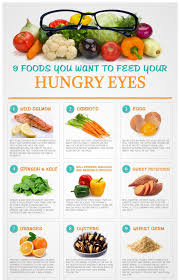
Having good eyesight even in old age is considered a blessing. However, some people do not experience that even in their youth due to some eye problems. Some of those problems can be avoided by having a healthy diet.
There are many nutrients found in foods that are good for boosting your eye health. Some of these nutrients include omega-3 fatty acids, lutein, zeaxanthin, and copper. To increase those nutrients in your body, reduce the amount of processed foods you consume.
Organic foods have been seen to have a lot of the nutrients required. Some of the organic foods to consume for better eye health include;
1. Leafy Green Vegetables
Dark green vegetables like kale, spinach, and collard greens are rich in vitamins A, C, and E. They also contain high amounts of two of the most critical antioxidants, lutein and zeaxanthin, vital for eye health.
Macula, the part of the eye that protects the eye from harmful light, stores the antioxidants. Lutein filters blue light from coming from phone screens and other electronic devices like televisions and computers.
The antioxidants also help in promoting effective blood flow to the eyes. The nutrients in the leafy green vegetables also help prevent severe eye diseases like cataracts and AMD (Age-related Macular Degeneration).
Leafy green vegetables can be eaten as salads, put in sandwiches, or added into smoothies.
2. Nuts, Legumes, And Seeds
Nuts, legumes, and seeds are rich in vitamin E and omega-3 fatty acids, which are vital in preventing severe long-term eye diseases. Legumes are also rich in Zinc and bioflavonoids, which protect the retina and lower the chances of getting AMD and cataracts.
Some of the common legumes include beans, black-eyed peas, and lentils. Some of the seeds and nuts that are rich in vitamin E and omega-3 include sunflower seeds, chia seeds, hemp seeds, flax seeds, peanuts, almonds, cashew nuts, walnuts, and Brazil nuts.
3. Eggs
Eggs are rich in zeaxanthin, lutein, vitamin E, C, and Zinc. Vitamin A helps protect the cornea. Zeaxanthin and lutein help in the prevention of severe long-term eye problems. Zinc promotes the health of the retina or the back of the eye from dangerous blue light.
It also helps improve vision at night. Eggs also help increase the levels of protective pigment in your macula, the part controlling central vision. The egg yolk also has vitamin D, which protects against macular degeneration.
Eggs are versatile and can be added to breakfast, lunch, or supper. They can also be eaten fried or boiled, or adding them to salads and other foods like bread.
4. Beef
Beef is rich in Zinc, which helps in better absorption of vitamin A into the retina, which helps in the development of melanin, the protective pigment. Vitamin A also helps in reducing the risk of AMD.
Zinc is also known to delay the occurrence of age-related macular degeneration and sight loss. Zinc is present in the eye, especially in the vascular tissue around the retina/ choroid and the retina. Zinc also boosts night vision and helps prevent cataracts.
5. Carrots
Carrots are rich in beta carotene, which gives them the orange color and vitamin A. Vitamin A is vital for good vision. It is a constituent of rhodopsin, a protein that assists the retina in light absorption.
Beta carotene and vitamin A protect the eye surface and help in the prevention of eye infections plus other eye conditions. Carrots can be added to a dish or can be eaten raw as a fruit.
6. Citrus Fruits
Citrus fruits have high amounts of vitamin C, which is an antioxidant that helps prevent age-related eye problems. It helps prevent free-radical damage, which helps fight AMG and cataracts. It also helps in boosting collagen levels, which aid in providing structure for the cornea.
Vitamin C also helps in the development of healthy blood vessels in the eye, which in turn promotes blood circulation. Some of the best citrus fruits include oranges, lemon, and grapefruit.
Most of these foods contain nutrients that help prevent cataracts. Cataracts cause the lenses of your eyes to become cloudy, which affects your vision.
Sometimes that cannot be treated by having a healthy diet, and you may need cataract surgery, which involves removing your eye lenses and replacing it with an artificial one. For that, you need a qualified optician like Dr. McLintock.
Autobiography
Elizabeth is a renowned leader in the space of Health and Mental Wellness topics. Her work has appeared on more than a dozen influential sites and blogs. Her articles both focus on providing valuable information and an entertaining read that her readers enjoy. More about her work on – ELIZABETHMARKS.me

